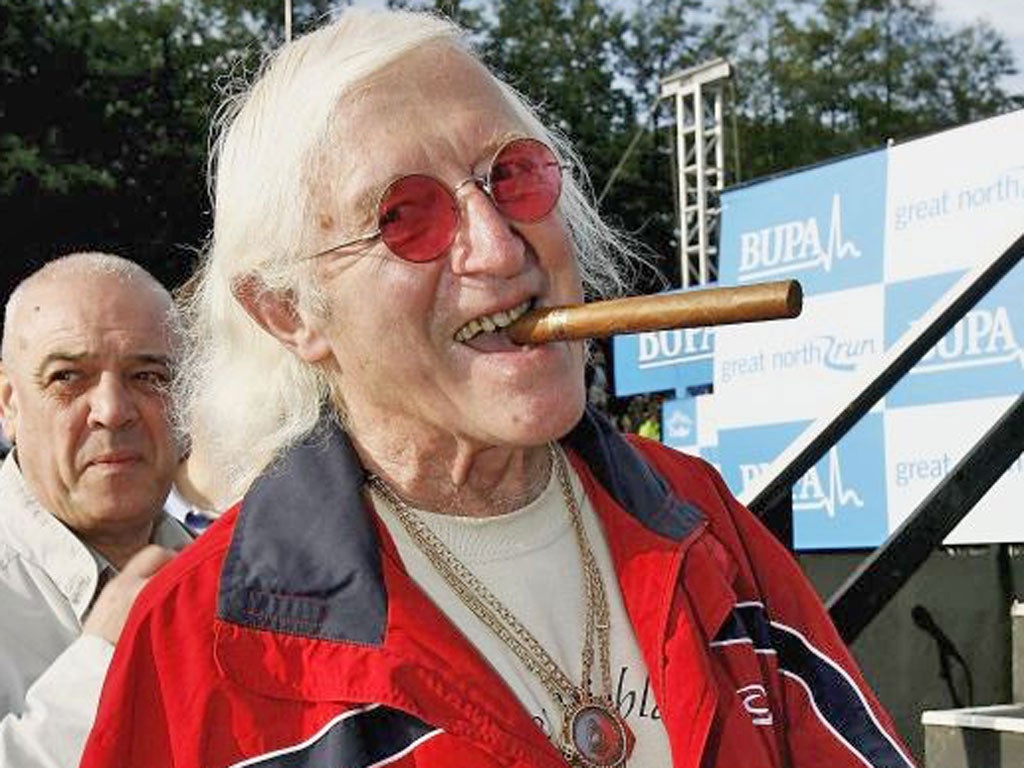The BBC's lack of action over Jimmy Savile abuse accusations amounts to a cover-up
Did the Corporation fail to act when given incriminating evidence? Was it culpably silent? The Chairman of the corporation has no choice but to order an investigation


Covering up mistakes is a common failing, almost natural. We do it in our private lives and institutions do it in their corporate lives. This week, the BBC stands in the dock for tts handling of allegations of child abuse directed at the late Jimmy Savile.
Cover-ups and non cover-ups often begin in the same way, with a flat denial. It’s hard to distinguish between them. The BBC said it had investigated allegations of misconduct by Savile during his time at the BBC, but “no such evidence has been found… it is simply not possible for the Corporation to take any further action”. It also said it hadn’t shelved an investigation after uncovering information about abuse. The charge was “absolutely untrue”.
In the case of an apparent deliberate cover-up, there is a long list of techniques used to keep secret an awful deed. When the big pharmaceutical companies are caught out, for instance, they have been known to put out false information about the qualities of the drug in question. Faulty memory is sometimes pleaded, as Rupert and James Murdoch did when responding to questions from a parliamentary committee.Preventing the discovery of evidence is another regular feature. That is why the jurors at the trial of Conrad Black, the former owner of The Daily Telegraph, were shown footage of him and his chauffeur removing boxes from his Canadian offices. Whether this was as compromising as it first appeared became a contested point.
Worse still is what happened after the Hillsborough football disaster when the police altered evidence to deflect blame. The recent inquiry found that 164 witness statements had been amended and 116 unfavourable to South Yorkshire Police had been removed.
The BBC’s handling of the Jimmy Savile allegations is clearly not remotely of this order. In this case, what needs testing is something quite different. The question is whether the Corporation engaged in a passive cover-up. Did it fail to act when presented with incriminating evidence? Was it silent when it should have been in touch with the police? After all, as Lynn Barber, who interviewed Savile for the Independent on Sunday in 1990, wrote at the time: “There have been persistent rumours about him for years and journalists have often told me as fact: Jimmy Savile? Of course you know he is into little girls.”
Before looking more closely at the BBC’s conduct, it is worth taking a detour to the Church of England diocese of Chichester. In not doing something that it should have done, it provides a frightening example of the consequences. At the end of August, the Archbishop of Canterbury condemned the Diocese of Chichester for its “appalling” record in handling allegations of sexual abuse by priests. Three local priests have been charged this year with child sex offences. And two priests were allowed to continue working despite being accused of serious abuse.
A report commissioned by the Archbishop found that the authorities in the diocese were very slow to recognise what was happening and did not act with rigour and expedition. Clergy engaged in behaviours that ought to have raised concerns, and their files contained histories that should have raised alarm bells in the minds of the senior leadership. “Slow to recognise”, “behaviours that ought to have raised concerns” and files “that should have raised alarm bells” are examples of a lethal carelessness.
In particular, the Archbishop’s investigators found that there were “recent and current examples where parish priests have been reluctant to investigate allegations against, say, youth workers, preferring to give the benefit of the doubt to the alleged perpetrator”. This is cover-up pure and simple, even though it does not involve tampering with evidence.
In this light to me it’s clear that the BBC has been involved in a passive cover-up. Lynn Barber reported what was common knowledge in 1990. In 2007, Surrey Police received an allegation of indecent assault, which is alleged to have occurred at a children’s home in Staines in the 1970s. Some years later, BBC’s Newsnight reporters began to investigate claims that Savile had molested a teenage girl. For days, the BBC has insisted it has never received any complaints about Savile’s behaviour. It has also repeatedly said that a decision to shelve the Newsnight investigation was taken for “editorial” reasons.
But the test is not whether Savile acted improperly on BBC premises or during the making of a BBC show, but whether he may have carried out indecent assaults in any circumstances at all. Where reasonable suspicion of a criminal offence exists, your duty does not stop at your front door. At a certain point, the persistence of rumours, of a strength sufficient to generate a Newsnight investigation, has to be taken as the proverbial smoke that indicates fire.
No wonder the BBC said on Tuesday evening that it was “horrified by allegations that anything of this sort could have happened at the BBC – or have been carried out by anyone working for the BBC”. Too late. Now the chairman, Lord Patten, must follow in the Archbishop of Canterbury’s footsteps and order an investigation of what seems to have been the Corporation’s sins of omission.
a.whittamsmith@independent.co.uk
Join our commenting forum
Join thought-provoking conversations, follow other Independent readers and see their replies
Comments